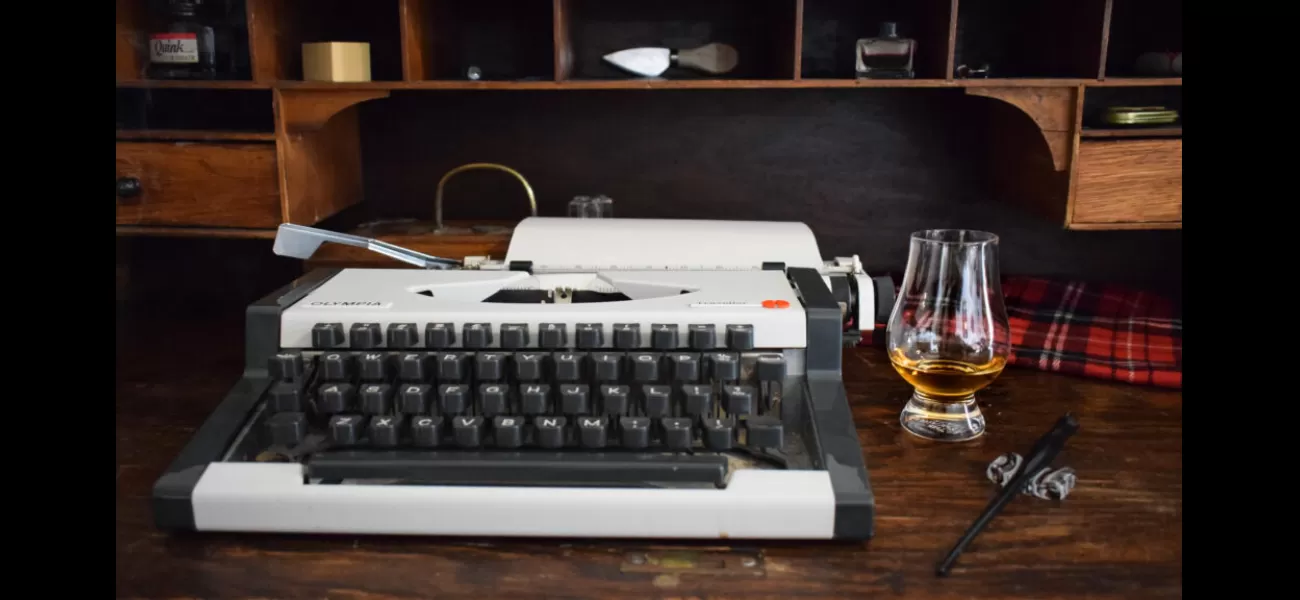A runner-up was chosen in a competition for a crime-themed short story written with a Glencairn glass as the focus.
Allan Gaw came second in a short story comp with his piece "The Last Tram to Gorbals Cross".
April 11th 2023.

Allan Gaw was the runner-up in the Glencairn Glass Short Story Competition with The Last Tram to Gorbals Cross. After reading his story, you should definitely check out the winning entry – The Dummy Railway by Francis Crawford in the May issue of Scottish Field magazine.
GLASGOW, 1928: A bluebottle thuds against the pane, searching for an exit. Its tiny body pulses and flexes, and black spiked legs turn it left and momentarily right. I sit frozen, watching it, imagining its thoughts - just like I do with people. I jerk my hand and swat it, clipping its side. The mess of the insect glistens. I lean in and nudge the lit fag-end towards its one good eye. It's stuck to the table with its own guts. Done, I flick it away and it falls into the shadows.
The whole room is dirty, it's deliberate – squalor helps un-nerve anyone who’s used to better. But I quite like it. It's quiet here, thick walls and only that high window to let the street in. That’s the clattering of trams, rolling along Saltmarket. I know them all. That’s the thirteen. Stops right outside the station. And there’s its bell, going over the Clyde and down towards Gorbals Cross.
At the far end of the duty room, DS Fyfe was fixing a large photograph to the pinboard. He knew he was being watched and probably pitied, but had no choice but to go along with what Chapman wanted. Chapman was English, young and had made it clear how he worked. He used an approach to consolidate all the evidence, connecting apparently disparate pieces of the story with red strings. Fyfe had been seeing its value, as it helped see the bigger picture.
I’ll tell you one thing, this table’s seen better days. I don’t mind though. Gives you time to think. I was surprised by how many young women travel alone at night. It was easy - just had to wait upstairs till they came up. Most were too busy fussing with their purses to notice. Then I'd pull their heads back with one hand and take the razor hard across their throats with the other. It was quick, wasn’t trying to make them suffer. Been in the papers too. My night work, that is. Nobody’s interested in what I do during the day. No pictures, though. Pity. But whatever way you look at it, it was their own fault for travelling alone at night.
Unannounced, Chapman appeared at Fyfe’s side. He sat but expected Fyfe to stand, using the board to present the case clearly and logically. All the while, Chapman’s eyes would be darting from photograph to note, following the connections and formulating new ones. Fyfe continued, while pointing at the board. The killer was likely left-handed and the conductors saw nothing. Chapman took three pins and pierced one in each photograph, then wound string around the first pin, stretched it across to the second and tied it off around the third.
“That’s what we need – the connection. That’ll give us a motive.” Fyfe had been working on just that but, thus far, had drawn a blank. Any man had the means – everyone had a razor – so all that was left to work with was opportunity. Suspicion had naturally fallen on the conductors but, again, there was no link. Three murders and three different conductors. Their photographs were on the board too and Fyfe was struck by how alike they were.
My job’s boring. Always on the move, up and down stairs all day long. Taken for granted. No one’s interested in what I do during the day. But whatever way you look at it, it was their own fault for travelling alone at night.
Allan Gaw was the runner-up in the Glencairn Glass Short Story Competition with his story, The Last Tram to Gorbals Cross. After reading his story, make sure to check out the winning entry - The Dummy Railway by Francis Crawford in the May issue of Scottish Field magazine.
Gorbals Cross, Glasgow, 1928 – a bluebottle buzzed around the room, making its unsteady attempts to escape. Fascinated, I watched its movements, empathizing with its struggle to find freedom. Then, in a sudden motion, I swatted it down and watched as the mess of its body remained still on the table.
The room was filled with smoke, and the walls had a distinct yellowish tint to them, due to years of smoking in the room. But I liked it, it gave me a sense of comfort. I had only been here for a few weeks, but I already felt at home.
What was stuck in my mind was the sound of the trams that ran along Saltmarket. I remembered them all, but the sound of the thirteenth tram was the one I liked the most. It was the one that went towards Gorbals Cross.
At the far end of the duty room, the senior officer, DCI Chapman, was fixing a large photograph to the pinboard. He had a new approach to consolidate all the evidence, and had used red strings to join apparently disparate pieces of the story.
Fyfe, the sergeant, and Chapman were going over the board and the evidence that had been collected. Three women, all killed upstairs on a late-night tram, throat cut from behind. But the last one, Millie Pollok, had managed to fight back, leaving skin under her fingernails.
The DCI's unique approach was already proving to be a great help in seeing the bigger picture and helped to unearth a motive in the case.
As I thought about the women and their tragic fates, I knew it was their own fault for travelling alone at night. My job was boring, and I felt like a nobody, but at least I was safe.
GLASGOW, 1928: A bluebottle thuds against the pane, searching for an exit. Its tiny body pulses and flexes, and black spiked legs turn it left and momentarily right. I sit frozen, watching it, imagining its thoughts - just like I do with people. I jerk my hand and swat it, clipping its side. The mess of the insect glistens. I lean in and nudge the lit fag-end towards its one good eye. It's stuck to the table with its own guts. Done, I flick it away and it falls into the shadows.
The whole room is dirty, it's deliberate – squalor helps un-nerve anyone who’s used to better. But I quite like it. It's quiet here, thick walls and only that high window to let the street in. That’s the clattering of trams, rolling along Saltmarket. I know them all. That’s the thirteen. Stops right outside the station. And there’s its bell, going over the Clyde and down towards Gorbals Cross.
At the far end of the duty room, DS Fyfe was fixing a large photograph to the pinboard. He knew he was being watched and probably pitied, but had no choice but to go along with what Chapman wanted. Chapman was English, young and had made it clear how he worked. He used an approach to consolidate all the evidence, connecting apparently disparate pieces of the story with red strings. Fyfe had been seeing its value, as it helped see the bigger picture.
I’ll tell you one thing, this table’s seen better days. I don’t mind though. Gives you time to think. I was surprised by how many young women travel alone at night. It was easy - just had to wait upstairs till they came up. Most were too busy fussing with their purses to notice. Then I'd pull their heads back with one hand and take the razor hard across their throats with the other. It was quick, wasn’t trying to make them suffer. Been in the papers too. My night work, that is. Nobody’s interested in what I do during the day. No pictures, though. Pity. But whatever way you look at it, it was their own fault for travelling alone at night.
Unannounced, Chapman appeared at Fyfe’s side. He sat but expected Fyfe to stand, using the board to present the case clearly and logically. All the while, Chapman’s eyes would be darting from photograph to note, following the connections and formulating new ones. Fyfe continued, while pointing at the board. The killer was likely left-handed and the conductors saw nothing. Chapman took three pins and pierced one in each photograph, then wound string around the first pin, stretched it across to the second and tied it off around the third.
“That’s what we need – the connection. That’ll give us a motive.” Fyfe had been working on just that but, thus far, had drawn a blank. Any man had the means – everyone had a razor – so all that was left to work with was opportunity. Suspicion had naturally fallen on the conductors but, again, there was no link. Three murders and three different conductors. Their photographs were on the board too and Fyfe was struck by how alike they were.
My job’s boring. Always on the move, up and down stairs all day long. Taken for granted. No one’s interested in what I do during the day. But whatever way you look at it, it was their own fault for travelling alone at night.
Allan Gaw was the runner-up in the Glencairn Glass Short Story Competition with his story, The Last Tram to Gorbals Cross. After reading his story, make sure to check out the winning entry - The Dummy Railway by Francis Crawford in the May issue of Scottish Field magazine.
Gorbals Cross, Glasgow, 1928 – a bluebottle buzzed around the room, making its unsteady attempts to escape. Fascinated, I watched its movements, empathizing with its struggle to find freedom. Then, in a sudden motion, I swatted it down and watched as the mess of its body remained still on the table.
The room was filled with smoke, and the walls had a distinct yellowish tint to them, due to years of smoking in the room. But I liked it, it gave me a sense of comfort. I had only been here for a few weeks, but I already felt at home.
What was stuck in my mind was the sound of the trams that ran along Saltmarket. I remembered them all, but the sound of the thirteenth tram was the one I liked the most. It was the one that went towards Gorbals Cross.
At the far end of the duty room, the senior officer, DCI Chapman, was fixing a large photograph to the pinboard. He had a new approach to consolidate all the evidence, and had used red strings to join apparently disparate pieces of the story.
Fyfe, the sergeant, and Chapman were going over the board and the evidence that had been collected. Three women, all killed upstairs on a late-night tram, throat cut from behind. But the last one, Millie Pollok, had managed to fight back, leaving skin under her fingernails.
The DCI's unique approach was already proving to be a great help in seeing the bigger picture and helped to unearth a motive in the case.
As I thought about the women and their tragic fates, I knew it was their own fault for travelling alone at night. My job was boring, and I felt like a nobody, but at least I was safe.
[This article has been trending online recently and has been generated with AI. Your feed is customized.]
[Generative AI is experimental.]
0
0
Submit Comment





